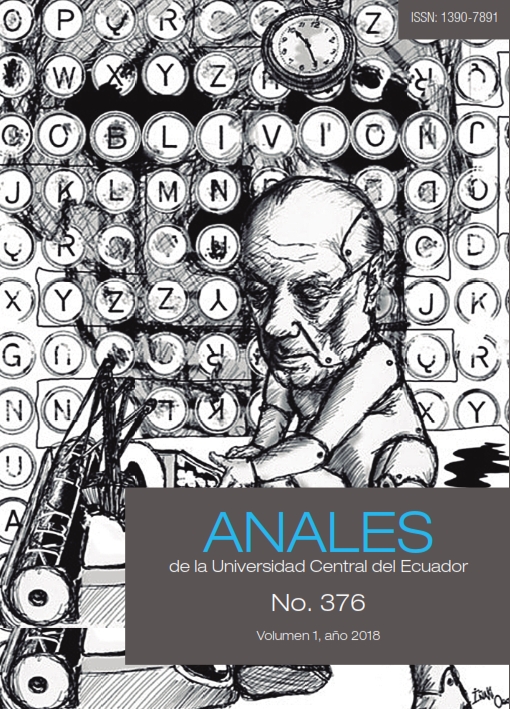This is an outdated version published on 2019-04-12. Read the most recent version.
Crítica y memoria en Fuga hacia dentro. La novela ecuatoriana en el siglo xx, de Alicia Ortega Caicedo
DOI:
https://doi.org/10.29166/anales.v1i376.1888Keywords:
Ecuador, Memory, Narrative, forgetting, semiotics of culture, Critical orphanhood, Hermeneutics, HistoriogrophyAbstract
In this text the critical work of Alicia Ortega, exposed in her book Fuga hacia dentro. La novela ecuatoriana en el siglo XX. For this, it is proposed that
Ortega carries out an intense immersion, both in the existing literary criticism and in the opinions of the writers of each period analyzed. Th is immersion implies the recognition of the critical memory of Ecuador and the opening towards a dialogue, understood in Bajtinian terms, such as the opening towards debate. Likewise, Ortega’s proposal breaks with the myth of “critical orphanhood” and strengthens the idea that without tradition we can’t understand any culturally determined discourse.
References
Aínsa, Fernando. 2011. “Los guardianes de la memoria: novelar contra el olvido”, en Cuadernos Americanos, 137. México.
Bajtín, Mijail. 1991. Teoría y estética de la novela. Madrid: Taurus.
Jaramillo, Pío. 2011. “El indio ecuatoriano” (texto seleccionado), en Pensamiento indigenista del Ecuador. Quito: Banco Central del Ecuador/Corporación Editora
Nacional.
Lotman, Yuri. 1996. Semiótica de la cultura. Madrid: Cátedra.
Ortega, Alicia. 2017. Fuga hacia dentro. La novela ecuatoriana en el siglo XX. Buenos
Aires: Corregidor/Universidad Andina Simón Bolívar, Sede Ecuador.
Vargas. José María. 2001. “Filosofía del arte”, en Teoría del arte en el Ecuador. Quito:
Banco Central del Ecuador/Corporación Editora Nacional.
Bajtín, Mijail. 1991. Teoría y estética de la novela. Madrid: Taurus.
Jaramillo, Pío. 2011. “El indio ecuatoriano” (texto seleccionado), en Pensamiento indigenista del Ecuador. Quito: Banco Central del Ecuador/Corporación Editora
Nacional.
Lotman, Yuri. 1996. Semiótica de la cultura. Madrid: Cátedra.
Ortega, Alicia. 2017. Fuga hacia dentro. La novela ecuatoriana en el siglo XX. Buenos
Aires: Corregidor/Universidad Andina Simón Bolívar, Sede Ecuador.
Vargas. José María. 2001. “Filosofía del arte”, en Teoría del arte en el Ecuador. Quito:
Banco Central del Ecuador/Corporación Editora Nacional.
Downloads
Published
2019-04-12
Versions
- 2020-08-18 (2)
- 2019-04-12 (1)
Issue
Section
FUGA HACIA DENTRO


